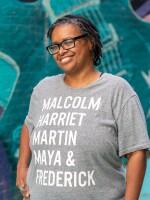In our “Black Art Matters” series, I talk with Black artists about how local and national protests are inspiring and fueling their work. Here is my conversation with Louisville painter Ashley Cathey, whose work deliberately centers Black people -- especially Black women. This interview has been edited for length and clarity.
89.3 WFPL News Louisville · Black Art Matters: Ashley Cathey
MICHELLE TYRENE JOHNSON: In the times that we're in right now, with you as a Black woman who's a local native, and the city is still very much in the place where folks are trying to get justice for Breonna Taylor, how is that influencing and informing your work?
ASHLEY CATHEY: It puts fuel under the fire that we'd already started here years ago fighting for representation, fighting to take up space and fighting to be heard. And honestly, for myself personally, finding to not be silenced as a Black woman, particularly in a space where they silenced a Black woman's death. And it's very important to me that we speak right now on these issues through our art, through our movement, through actions, through speaking and having conversations and dialogue. This is the time.
JOHNSON: Tell me a little bit about your medium that you work in.
CATHEY: I work in oil paint and acrylic paint mostly. I do some installation work, but I feel most comfortable in oil painting and acrylic on large scale. So I do large scale portraiture and mural work, because I feel that public art is extremely impactful. And it's very important that Black people are creating the work that speaks about us.
So often when you ride around in the city, and particularly in our city, you will see Black faces or you will see a Black narrative. And unfortunately, that was not a Black person that created it. It’s very, very important that we continue to speak through our work, especially in public. Public art, to me, is the gateway directly to the community. It is a way to uplift our community, to create ownership.
JOHNSON: You describe yourself as an artist and an art activist. Could you tell me the difference?
CATHEY: I create art that expresses who I am, and my story, and my history, always, in all facets of what I create. However, there is some art that is to be sold. And there's some art that goes into gallery spaces, or into museum spaces, and then we separate that from our activism. I feel that when I'm doing art as activism, it is created to evoke emotion, and to ultimately result in social change. Nina Simone says that as an artist, it's your responsibility to speak on what's happening right now, on the times.
JOHNSON: What is it about this time for you as a Black woman, who is from Louisville, that particularly sparks you?
CATHEY: I see Breonna Taylor as this person who was a Louisville native. This person was a Black woman just like me. She was a young Black woman who was fighting to save other people's lives, sacrificing just like we do every day. And just, you know, was from my city. And when I look at what's going on right now, it is extremely personal. Because I am Breonna Taylor. And anyone that's a Black woman in my city is the same, because you are not any different. When I drove here today, or I drive home, or I'm in my home, where I think that I'm safe, those rights could just be taken away from me.
So, I want to bring light to Black women, because we are so often silenced. I want to keep on speaking -- speaking through my art, speaking with my voice, in every place imaginable about the necessity for representation of Black women in particular. Because we are always leading some movement, some moment, always sacrificing our sleep, our time, our love, our energy, for everyone else. And here we are being killed, and no one cares to lock up the people who did it. And that's just very simple.



